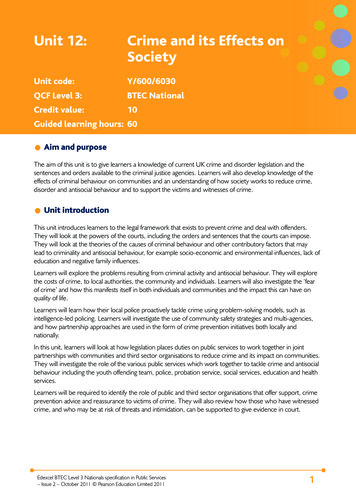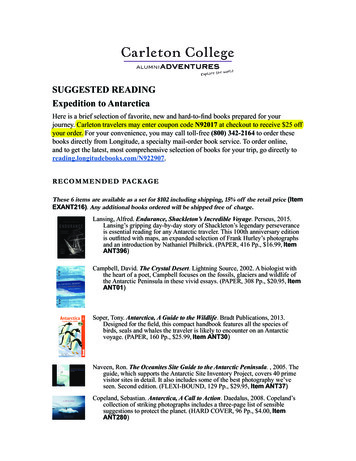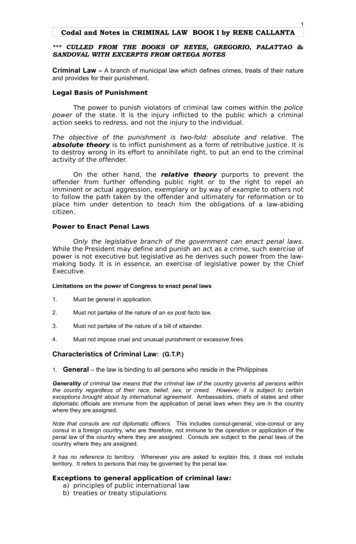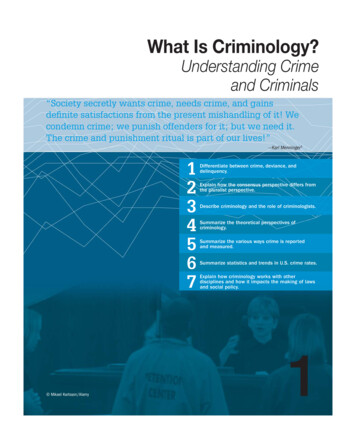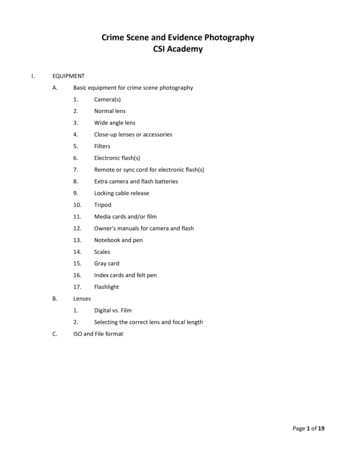
Transcription
Crime and PunishmentFyodor DostoevskyTranslated By Constance GarnettThis eBook is designed and published by Planet PDF. For more freeeBooks visit our Web site at http://www.planetpdf.com
Crime and PunishmentTRANSLATOR’S PREFACEA few words about Dostoevsky himself may help theEnglish reader to understand his work.Dostoevsky was the son of a doctor. His parents werevery hard- working and deeply religious people, but sopoor that they lived with their five children in only tworooms. The father and mother spent their evenings inreading aloud to their children, generally from books of aserious character.Though always sickly and delicate Dostoevsky cameout third in the final examination of the Petersburg schoolof Engineering. There he had already begun his first work,‘Poor Folk.’This story was published by the poet Nekrassov in hisreview and was received with acclamations. The shy,unknown youth found himself instantly something of acelebrity. A brilliant and successful career seemed to openbefore him, but those hopes were soon dashed. In 1849 hewas arrested.Though neither by temperament nor conviction arevolutionist, Dostoevsky was one of a little group ofyoung men who met together to read Fourier and2 of 967
Crime and PunishmentProudhon. He was accused of ‘taking part in conversationsagainst the censorship, of reading a letter from Byelinskyto Gogol, and of knowing of the intention to set up aprinting press.’ Under Nicholas I. (that ‘stern and justman,’ as Maurice Baring calls him) this was enough, andhe was condemned to death. After eight months’imprisonment he was with twenty-one others taken out tothe Semyonovsky Square to be shot. Writing to hisbrother Mihail, Dostoevsky says: ‘They snapped wordsover our heads, and they made us put on the white shirtsworn by persons condemned to death. Thereupon wewere bound in threes to stakes, to suffer execution. Beingthe third in the row, I concluded I had only a few minutesof life before me. I thought of you and your dear ones andI contrived to kiss Plestcheiev and Dourov, who werenext to me, and to bid them farewell. Suddenly the troopsbeat a tattoo, we were unbound, brought back upon thescaffold, and informed that his Majesty had spared us ourlives.’ The sentence was commuted to hard labour.One of the prisoners, Grigoryev, went mad as soon ashe was untied, and never regained his sanity.The intense suffering of this experience left a lastingstamp on Dostoevsky’s mind. Though his religious temperled him in the end to accept every suffering with3 of 967
Crime and Punishmentresignation and to regard it as a blessing in his own case,he constantly recurs to the subject in his writings. Hedescribes the awful agony of the condemned man andinsists on the cruelty of inflicting such torture. Thenfollowed four years of penal servitude, spent in thecompany of common criminals in Siberia, where he beganthe ‘Dead House,’ and some years of service in adisciplinary battalion.He had shown signs of some obscure nervous diseasebefore his arrest and this now developed into violentattacks of epilepsy, from which he suffered for the rest ofhis life. The fits occurred three or four times a year andwere more frequent in periods of great strain. In 1859 hewas allowed to return to Russia. He started a journal—‘Vremya,’ which was forbidden by the Censorshipthrough a misunderstanding. In 1864 he lost his first wifeand his brother Mihail. He was in terrible poverty, yet hetook upon himself the payment of his brother’s debts. Hestarted another journal—‘The Epoch,’ which within a fewmonths was also prohibited. He was weighed down bydebt, his brother’s family was dependent on him, he wasforced to write at heart-breaking speed, and is said neverto have corrected his work. The later years of his life were4 of 967
Crime and Punishmentmuch softened by the tenderness and devotion of hissecond wife.In June 1880 he made his famous speech at theunveiling of the monument to Pushkin in Moscow and hewas received with extraordinary demonstrations of loveand honour.A few months later Dostoevsky died. He was followedto the grave by a vast multitude of mourners, who ‘gavethe hapless man the funeral of a king.’ He is still probablythe most widely read writer in Russia.In the words of a Russian critic, who seeks to explainthe feeling inspired by Dostoevsky: ‘He was one ofourselves, a man of our blood and our bone, but one whohas suffered and has seen so much more deeply than wehave his insight impresses us as wisdom that wisdom ofthe heart which we seek that we may learn from it how tolive. All his other gifts came to him from nature, this hewon for himself and through it he became great.’5 of 967
Crime and PunishmentPART I6 of 967
Crime and PunishmentChapter IOn an exceptionally hot evening early in July a youngman came out of the garret in which he lodged in S. Placeand walked slowly, as though in hesitation, towards K.bridge.He had successfully avoided meeting his landlady onthe staircase. His garret was under the roof of a high, fivestoried house and was more like a cupboard than a room.The landlady who provided him with garret, dinners, andattendance, lived on the floor below, and every time hewent out he was obliged to pass her kitchen, the door ofwhich invariably stood open. And each time he passed, theyoung man had a sick, frightened feeling, which made himscowl and feel ashamed. He was hopelessly in debt to hislandlady, and was afraid of meeting her.This was not because he was cowardly and abject, quitethe contrary; but for some time past he had been in anoverstrained irritable condition, verging on hypochondria.He had become so completely absorbed in himself, andisolated from his fellows that he dreaded meeting, not onlyhis landlady, but anyone at all. He was crushed by poverty,but the anxieties of his position had of late ceased to weighupon him. He had given up attending to matters of7 of 967
Crime and Punishmentpractical importance; he had lost all desire to do so.Nothing that any landlady could do had a real terror forhim. But to be stopped on the stairs, to be forced to listento her trivial, irrelevant gossip, to pestering demands forpayment, threats and complaints, and to rack his brains forexcuses, to prevaricate, to lie—no, rather than that, hewould creep down the stairs like a cat and slip out unseen.This evening, however, on coming out into the street,he became acutely aware of his fears.‘I want to attempt a thing like that and am frightened bythese trifles,’ he thought, with an odd smile. ‘Hm yes,all is in a man’s hands and he lets it all slip from cowardice,that’s an axiom. It would be interesting to know what it ismen are most afraid of. Taking a new step, uttering a newword is what they fear most . But I am talking toomuch. It’s because I chatter that I do nothing. Or perhapsit is that I chatter because I do nothing. I’ve learned tochatter this last month, lying for days together in my denthinking of Jack the Giant-killer. Why am I goingthere now? Am I capable of that? Is that serious? It is notserious at all. It’s simply a fantasy to amuse myself; aplaything! Yes, maybe it is a plaything.’The heat in the street was terrible: and the airlessness,the bustle and the plaster, scaffolding, bricks, and dust all8 of 967
Crime and Punishmentabout him, and that special Petersburg stench, so familiarto all who are unable to get out of town in summer—allworked painfully upon the young man’s alreadyoverwrought nerves. The insufferable stench from the pothouses, which are particularly numerous in that part of thetown, and the drunken men whom he met continually,although it was a working day, completed the revoltingmisery of the picture. An expression of the profoundestdisgust gleamed for a moment in the young man’s refinedface. He was, by the way, exceptionally handsome, abovethe average in height, slim, well-built, with beautiful darkeyes and dark brown hair. Soon he sank into deepthought, or more accurately speaking into a completeblankness of mind; he walked along not observing whatwas about him and not caring to observe it. From time totime, he would mutter something, from the habit oftalking to himself, to which he had just confessed. At thesemoments he would become conscious that his ideas weresometimes in a tangle and that he was very weak; for twodays he had scarcely tasted food.He was so badly dressed that even a man accustomed toshabbiness would have been ashamed to be seen in thestreet in such rags. In that quarter of the town, however,scarcely any shortcoming in dress would have created9 of 967
Crime and Punishmentsurprise. Owing to the proximity of the Hay Market, thenumber of establishments of bad character, thepreponderance of the trading and working class populationcrowded in these streets and alleys in the heart ofPetersburg, types so various were to be seen in the streetsthat no figure, however queer, would have causedsurprise. But there was such accumulated bitterness andcontempt in the young man’s heart, that, in spite of all thefastidiousness of youth, he minded his rags least of all inthe street. It was a different matter when he met withacquaintances or with former fellow students, whom,indeed, he disliked meeting at any time. And yet when adrunken man who, for some unknown reason, was beingtaken somewhere in a huge waggon dragged by a heavydray horse, suddenly shouted at him as he drove past: ‘Heythere, German hatter’ bawling at the top of his voice andpointing at him—the young man stopped suddenly andclutched tremulously at his hat. It was a tall round hatfrom Zimmerman’s, but completely worn out, rusty withage, all torn and bespattered, brimless and bent on one sidein a most unseemly fashion. Not shame, however, butquite another feeling akin to terror had overtaken him.‘I knew it,’ he muttered in confusion, ‘I thought so!That’s the worst of all! Why, a stupid thing like this, the10 of 967
Crime and Punishmentmost trivial detail might spoil the whole plan. Yes, my hatis too noticeable . It looks absurd and that makes itnoticeable . With my rags I ought to wear a cap, any sortof old pancake, but not this grotesque thing. Nobodywears such a hat, it would be noticed a mile off, it wouldbe remembered . What matters is that people wouldremember it, and that would give them a clue. For thisbusiness one should be as little conspicuous as possible .Trifles, trifles are what matter! Why, it’s just such triflesthat always ruin everything .’He had not far to go; he knew indeed how many stepsit was from the gate of his lodging house: exactly sevenhundred and thirty. He had counted them once when hehad been lost in dreams. At the time he had put no faith inthose dreams and was only tantalising himself by theirhideous but daring recklessness. Now, a month later, hehad begun to look upon them differently, and, in spite ofthe monologues in which he jeered at his own impotenceand indecision, he had involuntarily come to regard this‘hideous’ dream as an exploit to be attempted, although hestill did not realise this himself. He was positively goingnow for a ‘rehearsal’ of his project, and at every step hisexcitement grew more and more violent.11 of 967
Crime and PunishmentWith a sinking heart and a nervous tremor, he went upto a huge house which on one side looked on to the canal,and on the other into the street. This house was let out intiny tenements and was inhabited by working people of allkinds—tailors, locksmiths, cooks, Germans of sorts, girlspicking up a living as best they could, petty clerks, etc.There was a continual coming and going through the twogates and in the two courtyards of the house. Three orfour door-keepers were employed on the building. Theyoung man was very glad to meet none of them, and atonce slipped unnoticed through the door on the right, andup the staircase. It was a back staircase, dark and narrow,but he was familiar with it already, and knew his way, andhe liked all these surroundings: in such darkness even themost inquisitive eyes were not to be dreaded.‘If I am so scared now, what would it be if it somehowcame to pass that I were really going to do it?’ he couldnot help asking himself as he reached the fourth storey.There his progress was barred by some porters who wereengaged in moving furniture out of a flat. He knew thatthe flat had been occupied by a German clerk in the civilservice, and his family. This German was moving outthen, and so the fourth floor on this staircase would beuntenanted except by the old woman. ‘That’s a good12 of 967
Crime and Punishmentthing anyway,’ he thought to himself, as he rang the bellof the old woman’s flat. The bell gave a faint tinkle asthough it were made of tin and not of copper. The littleflats in such houses always have bells that ring like that. Hehad forgotten the note of that bell, and now its peculiartinkle seemed to remind him of something and to bring itclearly before him . He started, his nerves were terriblyoverstrained by now. In a little while, the door wasopened a tiny crack: the old woman eyed her visitor withevident distrust through the crack, and nothing could beseen but her little eyes, glittering in the darkness. But,seeing a number of people on the landing, she grewbolder, and opened the door wide. The young manstepped into the dark entry, which was partitioned offfrom the tiny kitchen. The old woman stood facing himin silence and looking inquiringly at him. She was adiminutive, withered up old woman of sixty, with sharpmalignant eyes and a sharp little nose. Her colourless,somewhat grizzled hair was thickly smeared with oil, andshe wore no kerchief over it. Round her thin long neck,which looked like a hen’s leg, was knotted some sort offlannel rag, and, in spite of the heat, there hung flappingon her shoulders, a mangy fur cape, yellow with age. Theold woman coughed and groaned at every instant. The13 of 967
Crime and Punishmentyoung man must have looked at her with a rather peculiarexpression, for a gleam of mistrust came into her eyesagain.‘Raskolnikov, a student, I came here a month ago,’ theyoung man made haste to mutter, with a half bow,remembering that he ought to be more polite.‘I remember, my good sir, I remember quite well yourcoming here,’ the old woman said distinctly, still keepingher inquiring eyes on his face.‘And here I am again on the same errand,’Raskolnikov continued, a little disconcerted and surprisedat the old woman’s mistrust. ‘Perhaps she is always likethat though, only I did not notice it the other time,’ hethought with an uneasy feeling.The old woman paused, as though hesitating; thenstepped on one side, and pointing to the door of theroom, she said, letting her visitor pass in front of her:‘Step in, my good sir.’The little room into which the young man walked,with yellow paper on the walls, geraniums and muslincurtains in the windows, was brightly lighted up at thatmoment by the setting sun.‘So the sun will shine like this then too!’ flashed as itwere by chance through Raskolnikov’s mind, and with a14 of 967
Crime and Punishmentrapid glance he scanned everything in the room, trying asfar as possible to notice and remember its arrangement.But there was nothing special in the room. The furniture,all very old and of yellow wood, consisted of a sofa with ahuge bent wooden back, an oval table in front of the sofa,a dressing-table with a looking-glass fixed on it betweenthe windows, chairs along the walls and two or three halfpenny prints in yellow frames, representing Germandamsels with birds in their hands—that was all. In thecorner a light was burning before a small ikon. Everythingwas very clean; the floor and the furniture were brightlypolished; everything shone.‘Lizaveta’s work,’ thought the young man. There wasnot a speck of dust to be seen in the whole flat.‘It’s in the houses of spiteful old widows that one findssuch cleanliness,’ Raskolnikov thought again, and he stolea curious glance at the cotton curtain over the doorleading into another tiny room, in which stood the oldwoman’s bed and chest of drawers and into which he hadnever looked before. These two rooms made up thewhole flat.‘What do you want?’ the old woman said severely,coming into the room and, as before, standing in front ofhim so as to look him straight in the face.15 of 967
Crime and Punishment‘I’ve brought something to pawn here,’ and he drewout of his pocket an old-fashioned flat silver watch, on theback of which was engraved a globe; the chain was ofsteel.‘But the time is up for your last pledge. The month wasup the day before yesterday.’‘I will bring you the interest for another month; wait alittle.’‘But that’s for me to do as I please, my good sir, to waitor to sell your pledge at once.’‘How much will you give me for the watch, AlyonaIvanovna?’‘You come with such trifles, my good sir, it’s scarcelyworth anything. I gave you two roubles last time for yourring and one could buy it quite new at a jeweler’s for arouble and a half.’‘Give me four roubles for it, I shall redeem it, it wasmy father’s. I shall be getting some money soon.’‘A rouble and a half, and interest in advance, if youlike!’‘A rouble and a half!’ cried the young man.‘Please yourself’—and the old woman handed him backthe watch. The young man took it, and was so angry thathe was on the point of going away; but checked himself at16 of 967
Crime and Punishmentonce, remembering that there was nowhere else he couldgo, and that he had had another object also in coming.‘Hand it over,’ he said roughly.The old woman fumbled in her pocket for her keys,and disappeared behind the curtain into the other room.The young man, left standing alone in the middle of theroom, listened inquisitively, thinking. He could hear herunlocking the chest of drawers.‘It must be the top drawer,’ he reflected. ‘So she carriesthe keys in a pocket on the right. All in one bunch on asteel ring . And there’s one key there, three times as bigas all the others, with deep notches; that can’t be the keyof the chest of drawers then there must be some otherchest or strong-box that’s worth knowing. Strongboxes always have keys like that but how degrading itall is.’The old woman came back.‘Here, sir: as we say ten copecks the rouble a month, soI must take fifteen copecks from a rouble and a half for themonth in advance. But for the two roubles I lent youbefore, you owe me now twenty copecks on the samereckoning in advance. That makes thirty-five copecksaltogether. So I must give you a rouble and fifteen copecksfor the watch. Here it is.’17 of 967
Crime and Punishment‘What! only a rouble and fifteen copecks now!’‘Just so.’The young man did not dispute it and took the money.He looked at the old woman, and was in no hurry to getaway, as though there was still something he wanted to sayor to do, but he did not himself quite know what.‘I may be bringing you something else in a day or two,Alyona Ivanovna —a valuable thing—silver—a cigarettebox, as soon as I get it back from a friend ’ he broke offin confusion.‘Well, we will talk about it then, sir.’‘Good-bye—are you always at home alone, your sisteris not here with you?’ He asked her as casually as possibleas he went out into the passage.‘What business is she of yours, my good sir?’‘Oh, nothing particular, I simply asked. You are tooquick . Good-day, Alyona Ivanovna.’Raskolnikov went out in complete confusion. Thisconfusion became more and more intense. As he wentdown the stairs, he even stopped short, two or three times,as though suddenly struck by some thought. When he wasin the street he cried out, ‘Oh, God, how loathsome it allis! and can I, can I possibly . No, it’s nonsense, it’srubbish!’ he added resolutely. ‘And how could such an18 of 967
Crime and Punishmentatrocious thing come into my head? What filthy things myheart is capable of. Yes, filthy above all, disgusting,loathsome, loathsome!—and for a whole month I’vebeen .’ But no words, no exclamations, could express hisagitation. The feeling of intense repulsion, which hadbegun to oppress and torture his heart while he was on hisway to the old woman, had by now reached such a pitchand had taken such a definite form that he did not knowwhat to do with himself to escape from his wretchedness.He walked along the pavement like a drunken man,regardless of the passers-by, and jostling against them, andonly came to his senses when he was in the next street.Looking round, he noticed that he was standing close to atavern which was entered by steps leading from thepavement to the basement. At that instant two drunkenmen came out at the door, and abusing and supportingone another, they mounted the steps. Without stopping tothink, Raskolnikov went down the steps at once. Till thatmoment he had never been into a tavern, but now he feltgiddy and was tormented by a burning thirst. He longedfor a drink of cold beer, and attributed his suddenweakness to the want of food. He sat down at a stickylittle table in a dark and dirty corner; ordered some beer,19 of 967
Crime and Punishmentand eagerly drank off the first glassful. At once he felteasier; and his thoughts became clear.‘All that’s nonsense,’ he said hopefully, ‘and there isnothing in it all to worry about! It’s simply physicalderangement. Just a glass of beer, a piece of dry bread—and in one moment the brain is stronger, the mind isclearer and the will is firm! Phew, how utterly petty it allis!’But in spite of this scornful reflection, he was by nowlooking cheerful as though he were suddenly set free froma terrible burden: and he gazed round in a friendly way atthe people in the room. But even at that moment he had adim foreboding that this happier frame of mind was alsonot normal.There were few people at the time in the tavern.Besides the two drunken men he had met on the steps, agroup consisting of about five men and a girl with aconcertina had gone out at the same time. Their departureleft the room quiet and rather empty. The persons still inthe tavern were a man who appeared to be an artisan,drunk, but not extremely so, sitting before a pot of beer,and his companion, a huge, stout man with a grey beard,in a short full-skirted coat. He was very drunk: and haddropped asleep on the bench; every now and then, he20 of 967
Crime and Punishmentbegan as though in his sleep, cracking his fingers, with hisarms wide apart and the upper part of his body boundingabout on the bench, while he hummed some meaninglessrefrain, trying to recall some such lines as these:His wife a year he fondly lovedHis wife a—a year he—fondly loved.Or suddenly waking up again:Walking along the crowded rowHe met the one he used to know.But no one shared his enjoyment: his silent companionlooked with positive hostility and mistrust at all thesemanifestations. There was another man in the room wholooked somewhat like a retired government clerk. He wassitting apart, now and then sipping from his pot andlooking round at the company. He, too, appeared to be insome agitation.21 of 967
Crime and PunishmentChapter IIRaskolnikov was not used to crowds, and, as we saidbefore, he avoided society of every sort, more especially oflate. But now all at once he felt a desire to be with otherpeople. Something new seemed to be taking place withinhim, and with it he felt a sort of thirst for company. Hewas so weary after a whole month of concentratedwretchedness and gloomy excitement that he longed torest, if only for a moment, in some other world, whateverit might be; and, in spite of the filthiness of thesurroundings, he was glad now to stay in the tavern.The master of the establishment was in another room,but he frequently came down some steps into the mainroom, his jaunty, tarred boots with red turn-over topscoming into view each time before the rest of his person.He wore a full coat and a horribly greasy black satinwaistcoat, with no cravat, and his whole face seemedsmeared with oil like an iron lock. At the counter stood aboy of about fourteen, and there was another boysomewhat younger who handed whatever was wanted.On the counter lay some sliced cucumber, some pieces ofdried black bread, and some fish, chopped up small, all22 of 967
Crime and Punishmentsmelling very bad. It was insufferably close, and so heavywith the fumes of spirits that five minutes in such anatmosphere might well make a man drunk.There are chance meetings with strangers that interestus from the first moment, before a word is spoken. Suchwas the impression made on Raskolnikov by the personsitting a little distance from him, who looked like a retiredclerk. The young man often recalled this impressionafterwards, and even ascribed it to presentiment. Helooked repeatedly at the clerk, partly no doubt because thelatter was staring persistently at him, obviously anxious toenter into conversation. At the other persons in the room,including the tavern- keeper, the clerk looked as thoughhe were used to their company, and weary of it, showing ashade of condescending contempt for them as persons ofstation and culture inferior to his own, with whom itwould be useless for him to converse. He was a man overfifty, bald and grizzled, of medium height, and stoutlybuilt. His face, bloated from continual drinking, was of ayellow, even greenish, tinge, with swollen eyelids out ofwhich keen reddish eyes gleamed like little chinks. Butthere was something very strange in him; there was a lightin his eyes as though of intense feeling—perhaps therewere even thought and intelligence, but at the same time23 of 967
Crime and Punishmentthere was a gleam of something like madness. He waswearing an old and hopelessly ragged black dress coat,with all its buttons missing except one, and that one hehad buttoned, evidently clinging to this last trace ofrespectability. A crumpled shirt front, covered with spotsand stains, protruded from his canvas waistcoat. Like aclerk, he wore no beard, nor moustache, but had been solong unshaven that his chin looked like a stiff greyishbrush. And there was something respectable and like anofficial about his manner too. But he was restless; heruffled up his hair and from time to time let his head dropinto his hands dejectedly resting his ragged elbows on thestained and sticky table. At last he looked straight atRaskolnikov, and said loudly and resolutely:‘May I venture, honoured sir, to engage you in politeconversation? Forasmuch as, though your exterior wouldnot command respect, my experience admonishes me thatyou are a man of education and not accustomed todrinking. I have always respected education when inconjunction with genuine sentiments, and I am besides atitular counsellor in rank. Marmeladov—such is my name;titular counsellor. I make bold to inquire—have you beenin the service?’24 of 967
Crime and Punishment‘No, I am studying,’ answered the young man,somewhat surprised at the grandiloquent style of thespeaker and also at being so directly addressed. In spite ofthe momentary desire he had just been feeling forcompany of any sort, on being actually spoken to he feltimmediately his habitual irritable and uneasy aversion forany stranger who approached or attempted to approachhim.‘A student then, or formerly a student,’ cried the clerk.‘Just what I thought! I’m a man of experience, immenseexperience, sir,’ and he tapped his forehead with hisfingers in self-approval. ‘You’ve been a student or haveattended some learned institution! But allow me .’ Hegot up, staggered, took up his jug and glass, and sat downbeside the young man, facing him a little sideways. He wasdrunk, but spoke fluently and boldly, only occasionallylosing the thread of his sentences and drawling his words.He pounced upon Raskolnikov as greedily as though hetoo had not spoken to a soul for a month.‘Honoured sir,’ he began almost with solemnity,‘poverty is not a vice, that’s a true saying. Yet I know toothat drunkenness is not a virtue, and that that’s even truer.But beggary, honoured sir, beggary is a vice. In povertyyou may still retain your innate nobility of soul, but in25 of 967
Crime and Punishmentbeggary—never—no one. For beggary a man is not chasedout of human society with a stick, he is swept out with abroom, so as to make it as humiliating as possible; andquite right, too, forasmuch as in beggary I am ready to bethe first to humiliate myself. Hence the pot-house!Honoured sir, a month ago Mr. Lebeziatnikov gave mywife a beating, and my wife is a very different matter fromme! Do you understand? Allow me to ask you anotherquestion out of simple curiosity: have you ever spent anight on a hay barge, on the Neva?’‘No, I have not happened to,’ answered Raskolnikov.‘What do you mean?’‘Well, I’ve just come from one and it’s the fifth nightI’ve slept so .’ He filled his glass, emptied it and paused.Bits of hay were in fact clinging to his clothes and stickingto his hair. It seemed quite probable that he had notundressed or washed for the last five days. His hands,particularly, were filthy. They were fat and red, with blacknails.His conversation seemed to excite a general thoughlanguid interest. The boys at the counter fell to sniggering.The innkeeper came down from the upper room,apparently on purpose to listen to the ‘funny fellow’ andsat down at a little distance, yawning lazily, but with26 of 967
Crime and Punishmentdignity. Evidently Marmeladov was a familiar figure here,and he had most likely acquired his weakness for highflown speeches from the habit of frequently entering intoconversation with strangers of all sorts in the tavern. Thishabit develops into a necessity in some drunkards, andespecially in those who are looked after sharply and keptin order at home. Hence in the company of other drinkersthey try to justify themselves and even if possible obtainconsideration.‘Funny fellow!’ pronounced the innkeeper. ‘And whydon’t you work, why aren’t you at your duty, if you are inthe service?’‘Why am I not at my duty, hon
Crime and Punishment 2 of 967 TRANSLATOR’S PREFACE A few words about Dostoevsky himself may help the English reader to
